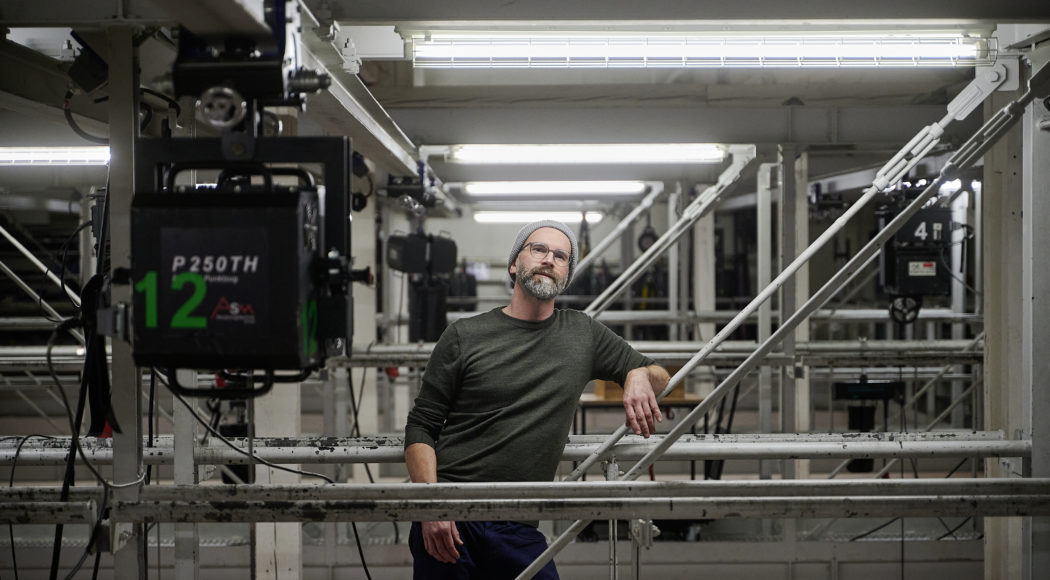Faces of HELLERAU – Roman Keilhofer, event technology specialist (upper machinery) at HELLERAU
“You can imagine my work like that of a puppeteer”
How long have you been working at HELLERAU and what are your tasks?
I started at HELLERAU in October 2003 as a production assistant during my studies. Three years later, I qualified as an expert in lifting gear and lifting beam systems and moved to the upper machine shop. From October 2022 to May 2023, I completed in-service training to become a specialist in event technology and passed an examination at the Chamber of Industry and Commerce in July. Since then, I have been a permanent employee at HELLERAU and am mainly responsible for the upper machinery. Here I make sure that things can be hung up on a stage: Lamps, loudspeakers, decorations, curtains and much more. This requires an understanding of statics and the ability to move things in order to make scenic sequences possible on the one hand and to make them more interesting on the other. The whole thing is called “rigging”. Depending on the company’s requirements, this includes programming and controlling scenic rides and building special scenic effects, i.e. working with and against gravity. So you can imagine my work a bit like that of a puppeteer.
What does a week actually look like for you?
On Monday, we usually start by dismantling the previous event and go straight into preparing the set-up for the next show. When the company arrives, we make adjustments and hand over the supervision of the production to the other crews such as sound or lighting. Over the course of the week, I then switch from a technical job to office work and prepare the productions for the coming weeks. I check the technical requirements of the companies: What is needed? Can I prepare it accordingly? Do I need to hire equipment? Then it’s time to write the so-called “rigging plans”, i.e. the required resources for the next production.
What do you particularly like about your work at HELLERAU?
Different artists come to our theater every week, and each production has its own unique aspects. We are also lucky enough to be able to change the Great Hall in any direction, depending on what is needed. This makes the work very varied. The artists come from very different theaters or situations where they have developed their plays. We then work with them to see how this can be implemented in our company. This also gives the work a creative component.
What was a particular challenge that you overcame?
It’s always challenging when things can’t be implemented as planned. One such situation was Meg Stuart’s play “Until our Hearts Stop” at the Münchner Kammerspiele. It was already a large stage set that had to be changed at short notice. When the setup was finished and the cube was hanging in the room, Meg Stuart said that two surfaces, so-called “wings”, were too short. The whole thing could no longer be brought down and rebuilt and therefore had to be adjusted in the air with a lot of rope technology and hanging on the rope and harness, which was quite a complex maneuver. We were glad that it actually worked out.
What do you wish HELLERAU for the future?
We have been working together as a permanent technical team at HELLERAU since the beginning of 2023. In the meantime, we’ve developed a great structure here that allows us to work well together across disciplines. I hope that this momentum will continue. I also hope that HELLERAU will continue to host diverse, international productions. They are the salt in the soup and what attracts me here: the international flair.
The interview was conducted by Henriette Roth


